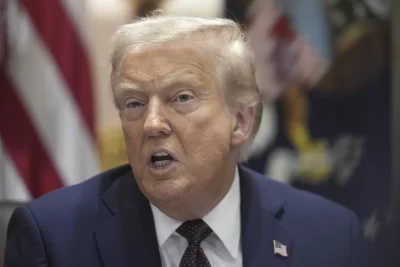
WASHINGTON — It’s not just the presidential election: Foreign governments are targeting House and Senate races around the country in their effort to meddle with American democracy this election year, intelligence officials warned Monday.
Russia and China have launched influence operations designed to help or hurt candidates in specific congressional races. Without giving specifics about the number of affected races, an official from the Office of the Director of National Intelligence said Monday that both countries have zeroed in on races where they believe they have a national security interest at stake.
Other smaller nations may be trying their own influence operations, officials said. Cuba is “almost certainly” trying to boost candidates that the Cuban government believes would support their interests in America, according to a report on foreign election threats released Monday, roughly a month out from the election.
The warning from intelligence officials comes during a particularly tight battle for the House and Senate, where control could be decided by just a handful of races. While much of the attention has focused on attempts by foreign adversaries to influence the presidential race, Monday’s warning underscores the threat that online disinformation also poses in state and local contests.
Leaders in Russia and China understand the American political system well enough to recognize that this year’s close elections create good conditions for the use and spread of disinformation, said the official, who briefed reporters on condition of anonymity under rules set by the office of the director.
Foreign adversaries have also targeted some races even further down the ballot, including statewide offices and state legislative campaigns, the official said.
Moscow’s goal is to erode support for congressional candidates who favor assisting Ukraine in its war with Russia. Officials wouldn’t say which candidates were targeted, but it’s likely that the Kremlin’s effort is intended to hurt Democrats and centrist Republicans who have supported Ukraine.
China has targeted candidates from both parties based on their stance on issues of key importance to Beijing, including support for Taiwan. Officials said they have observed Chinese disinformation agencies focusing on candidates in “tens” of races.
Officials also said that Cuba has in past elections tried to help candidates that it views as supportive of better relations with the island, such as reduced economic sanctions. They said it was highly likely that leaders in Havana were mounting similar campaigns ahead of an election that could have big consequences for relations with Washington.
Influence operations can include false or exaggerated claims and propaganda designed to mislead voters about specific candidates, issues or races. It can also include social media posts or other digital content that seeks to suppress the vote through intimidation or by giving voters false information about election procedures.
Along with cyberattacks on election systems, influence operations that stoke distrust and divisiveness are a critical threat facing the 2024 election, national security officials have said.






